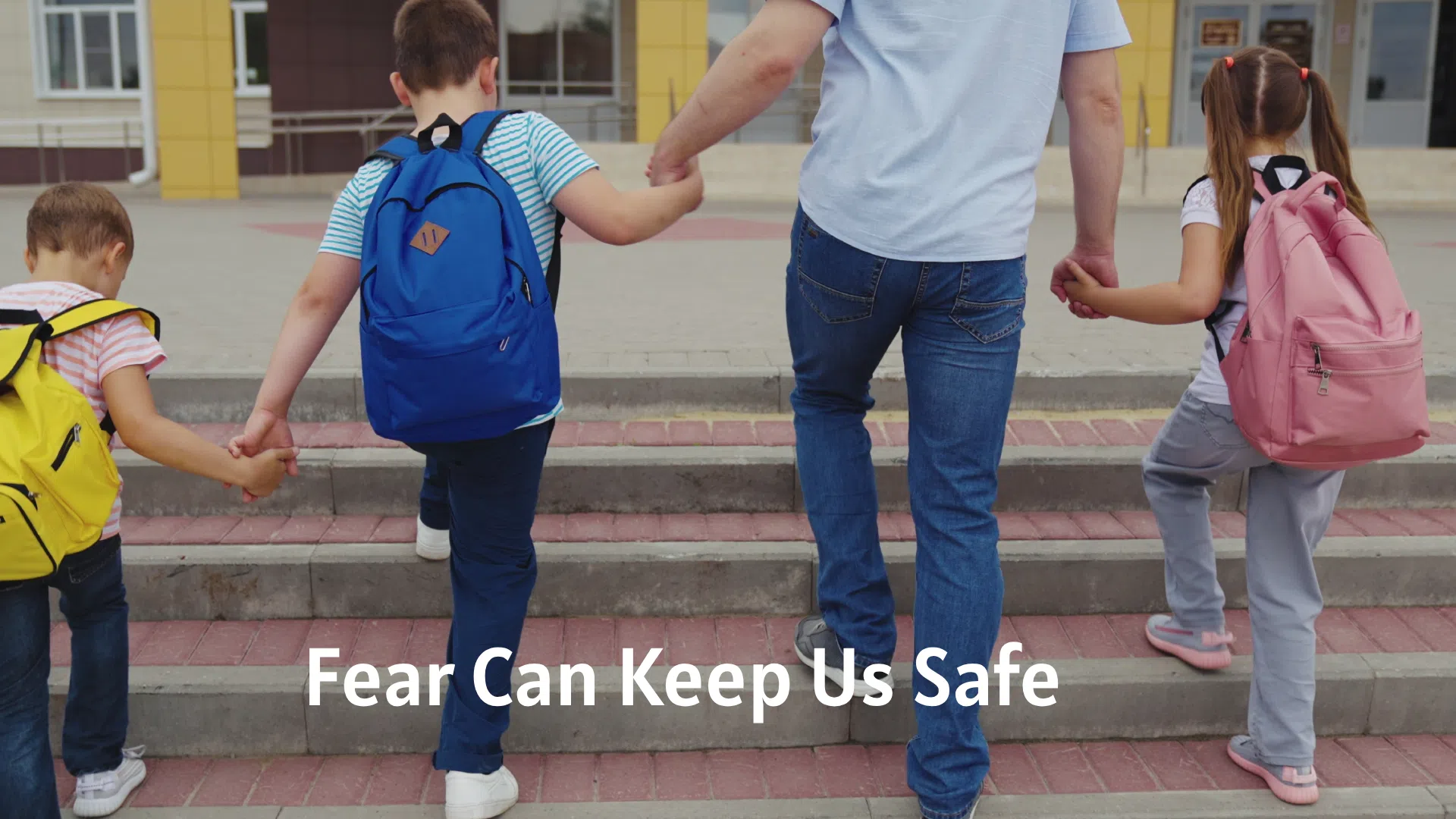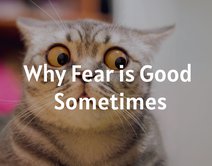It might seem embarrassing when something gives you a fright, but fears help us in ways we would never expect. Find out why fears are good sometimes, and how to embrace the virtues of good fears.
Fears are things that can incapacitate us, rule our lives, and bring out the worst parts of us. Most people devote a lot of time and energy to avoiding the things, people, and situations that they are afraid of. A lot of people don't want to admit to having fears, or spend a lot of their lives ruled by fears. These aren't good things. Did you know that sometimes fear is good though? Join Mysticsense To learn the brighter side of fears. Find out what fear is and why we have fears. Discover how fear can be bad for us, but on the flip side why fear is sometimes a good thing. Find out most importantly how to use fears to your advantage. There's nothing wrong with good fears, so read on to learn all about them.
What is Fear?

Merriam-Webster online defines fear as “ An unpleasant, often strong emotion caused by anticipation or awareness of danger.” Cambridge.org says it is “ An unpleasant emotion or thought that you have when you are frightened or worried by something dangerous, painful, or bad that is happening or might happen.” Fear can also refer to that which you are afraid of. Fear causes behavioral and physical changes in our bodies. Human beings aren't the only ones who are fearful, but we might be the only species that tries to pretend that we're not.
There is a stigma attached to fear. Some people say that they're not afraid of anything and anybody who is afraid of anything at all is weak or a coward. Some people insist that they are brave no matter what. Bravery isn't lack of fear, but it is the ability to function, persevere, and achieve things without being held back by fear. We are all afraid sometimes, all we have to do is learn how to be brave. Find out how to find your inner bravery here: Find Your Inner Courage and Embrace Your Power
Why We Have Fears
Scientifically speaking, fear is just part of being human. When your body perceives a threat, the brain signals you to action. Fear is a protective mechanism that triggers chemical and emotional responses to alert us to danger. When we perceive a threat and are afraid, it triggers something called the fight or flight response. This means that your body prepares itself for defense and for confronting the threat, or it gives us the strength to run away from that threat. If we just stand still and let dangers ravage us we won't survive very long, well we?
Some experts call this fight or flight mechanism the stress response. Harvard Health Publishing explains that when you are faced with danger, your senses send information to the amygdala, the section of the brain that helps with the emotional processes. It interprets the information and it sends a distress signal to another part of the brain called the hypothalamus. This section of the brain acts as a command center sending messages to the autonomic nervous system which will control things such as blood pressure, heartbeat, and breathing. Part of this is the sympathetic nervous system which would trigger that fight or flight response like the gas pedal in a car. Read more from Harvard Health here: Understanding the stress response - Harvard Health
Our stress response is what gets us out of danger by first alerting us that there is a problem. A lot of people don't live under the circumstances that we would have hundreds of years ago. We don't have to worry about being attacked at night by wolves, and a lot of diseases that could have easily killed us before can be treated with medications. A lot of people don't hunt for their food, so the need to defend ourselves and the wild isn't quite what it used to be. We still have plenty of stressors in modern society though. Fights and the office can lead to termination which will threaten your financial well-being and therefore your livelihood. Fear still has a place in our lives.
How Fear Can Be Bad

Even though fear is something that our bodies naturally developed as defense mechanisms for survival, if taken too far, it can be a bad thing. An initial sense of fear can elicit an irrational panic response which can trigger a serious misunderstanding. We can over analyze things and inflate fears. We can also allow fears that we would otherwise be able to overcome to incapacitate us.
We Can Misunderstand Things
When we are afraid, sometimes it's difficult to listen. We might feel such a powerful need of self-preservation that we shut down and focus only on what protects us. When we are emotionally hurt, we are especially at risk of this. When we are hurt, sometimes we want to strike out in defense, and say things that we later regret. You might feel hurt if your best friend makes new friends with somebody else, and it might make you afraid that they're not your best friend anymore. It is always best when we experience fear to pay attention to what's going on and listen. Empaths were especially good at this. Do you have the psychic ability of empathy? Find out here: How to Tell if You Are an Empath
We Can Overanalyze Things
Over analyzing things as another danger that can arise when we're afraid. Say a dog bit you many years ago. You may be suspicious of every dog you meet after that, over analyzing them all and running from them as if they are all vicious animals. Some people who are afraid of dogs won't even be friends with people who have dogs. If your office is doing layoffs, you may over analyze the situation, taking everything that happens personally and worrying that it means that your job is threatened. This is natural because we feel like if we know what to expect we can act in ways that benefit us when bad things happen. Just try not to overdo it.
Fear Can Incapacitate Us
In worst case scenarios, fears can become phobias and completely incapacitate us. Surviving an automobile accident can make some people decide that they never want to get in another automobile again. After heartbreak, fear of it happening again causes some people to shut down emotionally and close people out. Fear of spiders keeps some people from going for walks in nature. Fears are supposed to keep us safe, not hold us back from experiencing life. If your fears are holding you back from good things, reexamine them and push past them. Just because bad things happen in love doesn't mean better love can't happen. Will time heal a broken heart? Find out here: Will Time Heal a Broken Heart?
How Fear Can Be Good
Even though fear can be bad it can also be very good. Remember we developed fears naturally as a defense mechanism. Fear is designed to warn us to give us time to react and it teaches us things. It teaches us about situations, about other people, and about ourselves. Fear, when it acts the way that it's supposed to, keeps us safe.
Fear Warns Us
When fear hits you, it lets you know that something is wrong. It doesn't matter if people disagree with you about that. Sometimes it's best to listen to your own intuition when your body and mind are telling you to get out of a situation. That flutter of panic that you feel in your chest and that adrenaline rushing through your body give you the strength to protect yourself by standing your ground, or to step away. This warning signal prompts you to make a decision. Will you stand up for yourself, or is the threat so great it could destroy you, in which case you need to leave? If you decide that it's time to leave there is only one way to move in life- forward. Sometimes we have to decide whether to move forward in a relationship or forward away from it. Read about how to make that decision here: Move Forward or Get Back Together With Someone?
Fear Teaches Us About Things
Not only does fear teach us about things- it teaches us about people. If you have had a bad experience with somebody who became violent after yelling, you might be afraid of other people who yell. If you slip and fall on the ice and hurt yourself, you might be afraid of that happening again so you'll be more careful. If you were bitten by a dog you didn't know, you might be afraid of approaching another strange animal. Frightening situations teach us bad things that can happen, and terrifying behavior teaches us about people. Our fears also teach us about ourselves.
If everybody who you know is afraid of something that you're not, you learn about your own kind of bravery. The way that you behave when you're afraid also teaches you about yourself. Do you stand your ground and fight, or do you move as quickly as possible to get out of harm's way? Do you ask for help when you're afraid, or try to protect yourself without anybody else's assistance? Does a fearful situation make you ashamed of yourself, or does it make you step up to take action? Pay attention and learn as much as you can from fear, you will be surprised what it reveals.
Fear Can Keep Us Safe

Because fear alerts us to threats, those alerts should be taken seriously. Sometimes we think it's better to pretend that a danger doesn't exist because it makes us feel calmer. Keeping a level head while you're deciding what to do in response to something that's wrong is very important, but ignoring the threat is not the way to do it. A lot of things happen in life that can harm us. Toxic people will drag us into toxic relationships if we allow it. People who see you as unfair competition may try to make you look bad at work and threaten your job. People may even try to take advantage of you in public if they think you'll let them. Listen to your fears when they warn you about a person or a situation so you can stay safe. Are you in a toxic relationship? Find out here: Are You In A Toxic Relationship? | 10 Signs of Toxic People
How to Take Advantage of Fear
Fear can either be a tool, almost like a weapon for protection, or it can be something that we use against ourselves. When fear kicks in, it's a sign that something is wrong. So you have to make a decision. You can't make that decision until you have all the information that you need. So, take a deep breath and ask yourself a few things. First, is there a real threat or are you panicking and there's actually nothing wrong? It's ok to assess a situation, but if you decide that there's nothing wrong, you may be struggling with something called a phobia. A phobia is an irrational fear, and it isn’t helpful at all. Do you struggle with phobias? Find out here: Phobia- That Thing That Scares Us
If a phobia has not been triggered, how bad is the situation? Do you need to act immediately, or can you take some time to think things over? Oftentimes, when the stress response kicks in, you may have to make a quick decision and that decision will be rather to stand your ground, or leave. If the threat is something that you perceive as more powerful than you, you aren't a coward if you remove yourself from the situation. It would be foolish to stand in harm's way. The goal of using fear to your advantage is for protection, not to brag about how unafraid you are.
If you decide that you have the power to win over a threat, one thing to keep in mind is that standing your ground is only necessary until the threat is removed. You don't need to display your power beyond that. Celebrating a victory might not even be necessary. Once the stress response wears off your mind and body may struggle with exhaustion. Remembering that self-preservation is the goal of the stress response, once everything is okay again, disengage and rest.
An example is if a colleague tries to upstage you at a meeting, trying to diminish the work that you've done, defend your work, explaining what you've done, and leave it at that. It's not necessary to criticize their work to try and assert dominance. There will always be people who pick fights, and nothing will change that. Another example is if somebody cuts in line ahead of you at the supermarket, telling them that you were there first is good enough if they step out of line. Yelling isn’t necessary. If another driver almost hits your car, simply drive away, thankful to be safe if there is no accident. Yelling at them or gesturing isn’t helpful. Address the threat and then move on. Problem solved.
Fears are upsetting and they can drain us emotionally, but unless we let them completely rule us, fears are designed to protect us. Fears can be bad if we allow them to make us miscommunicate or over analyze things and they can be bad when they completely incapacitate us. Fears however, are our natural mechanism to help us to keep safe. They warn us about bad situations, they teach us about ourselves, other people and scenarios, and they'll let us know to get to safety. These are nothing to be ashamed of, but something to be thankful for. So when something frightens you, listen to yourself. Your safety may depend on it.
Are you in a terrifying situation and you don't know what to do? Reach out to us anytime and any day for answers. We are always here for you.
We have selected the most relevant psychics for this article, you can connect with any of them and get accurate advice on this subject.









